| Listing 1 - 8 of 8 |
Sort by
|
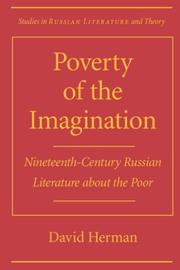
ISBN: 0810116928 0810121301 Year: 2001 Publisher: Evanston, Illinois : Northwestern University Press,
Abstract | Keywords | Export | Availability | Bookmark
 Loading...
Loading...Choose an application
- Reference Manager
- EndNote
- RefWorks (Direct export to RefWorks)
The primal scene of all nineteenth-century Western thought might well be the moment an observer gazed at someone poor, most commonly on the streets of a great metropolis, and wondered what the spectacle meant in human, moral, political, and metaphysical terms. In Russia, where so much of the population was impoverished, the moment held special significance. David Herman examines how Russian writers portrayed this poverty and what their portrayal reveals and articulates about core values of Russian culture.Focussing on specific texts but addressing the literary tradition as a whole, Herman begins with Karamzin's immensely popular story "Poor Liza", the first in a sequence of poverty narratives that self-consciously address one another. He then considers Pushkin's "Egyptian Nights"; Gogol's "Overcoat", Petersburg tales, and Selected Passages; and Dostoevsky's Idiot and 1880 "Pushkin speech".With a series of innovative readings, Poverty of the Imagination teases out a Russian discourse on lack which owes its peculiar richness to an insistence on solving simultaneously problems of social justice, national identity, and the ethics of the human imagination. As prominently as poverty figures in Russian literature, this is the first sustained analysis of its literary, conceptual, and cultural implications. As such, it deepens our understanding and appreciation of some of the most widely read literature of all time.
Russian literature --- Poor in literature. --- Poverty in literature. --- History and criticism.
Book

ISBN: 311036574X 3110391368 9783110365740 9783110391367 9783110367935 3110367939 3110365758 Year: 2014 Publisher: Berlin Boston
Abstract | Keywords | Export | Availability | Bookmark
 Loading...
Loading...Choose an application
- Reference Manager
- EndNote
- RefWorks (Direct export to RefWorks)
Poverty and precarity have gained a new societal and political presence in the twenty-first century's advanced economies. This is reflected in cultural production, which this book discusses for a wide range of media and genres from the novel to reality television. With a focus on Britain, its chapters divide their attention between current representations of poverty and important earlier narratives that have retained significant relevance today.The book's contributions discuss the representation of social suffering with attention to agencies of enunciation, ethical implications of 'voice' and 'listening', limits of narratability, the pitfalls of sensationalism, voyeurism and sentimentalism, potentials and restrictions inherent in specific representational techniques, modes and genres; cultural markets for poverty and precarity. Overall, the book suggests that analysis of poverty narratives requires an intersection of theoretical reflection and a close reading of texts.
Poverty in literature --- Social problems in literature --- English fiction --- English literature --- History and criticism --- Poverty. --- literature, precarity, social suffering.
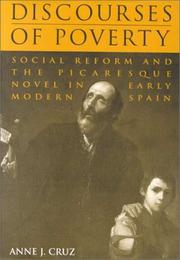
ISBN: 0802044395 9786612037061 1282037064 1442673958 9780802044396 Year: 1999 Volume: *76 Publisher: Toronto, [Ontario] ; Buffalo, [New York] ; London, [England] : University of Toronto Press,
Abstract | Keywords | Export | Availability | Bookmark
 Loading...
Loading...Choose an application
- Reference Manager
- EndNote
- RefWorks (Direct export to RefWorks)
In this ground-breaking study, Anne Cruz examines the treatment of poverty, prostitution, war, and other social concerns in the cultural and literary discourses of early modern Spain. This book investigates the polemics on poor relief through religious charity and secularized reform articulated not only in the Spanish picaresque canon - Lazarillo de Tormes, Guzm¯n de Alfarache, El busc3/4n - but also in female picaresque narratives and soldiers' tales. Emphasizing Bakhtin's notion that discursive practices must be assessed as they intersect and become textualized in history, the book also looks at this literature in relation to normative writings such as royal decrees, regulations, economic proposals, synods, and sermons. Through these discourses, authors and authorities alike debated their theories of poor assistance for both men and women, from the critique of unregulated prostitution in works such as La lozana andaluza to the control of impoverished youths through military conscription as in Alonso de Contreras and Estebanillo Gonz¯lez. The rupture of the feudal system and the economic devastation of the country precipitated a dramatic rise in the number of poor, who were increasingly perceived as delinquents by an anxious populace. The book employs Foucault's paradigms of confinement and control to study the various suggestions for the social containment of Spain's marginalized elements. Positing that the literary p¦caros and p¦caras assume the role of scapegoats for this disenfranchised social Other, Cruz further argues that the picaresque novels respond dialectically to the growing demonization of the poor in early modern Spanish culture.
Armoede in de literatuur --- Pauvreté dans la littérature --- Poverty in literature --- Picaresque literature, Spanish --- Spanish fiction --- Poor in literature --- Social problems in literature --- History and criticism --- Picaresque literature [Spanish ] --- Classical period, 1500-1700 --- Poverty in literature. --- Poor in literature. --- Social problems in literature. --- History and criticism.
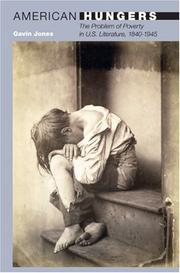
ISBN: 9780691127538 9780691143316 0691127530 9781400831913 1400831911 1282453149 9781282453142 0691143315 9786612453144 Year: 2009 Publisher: Princeton, NJ
Abstract | Keywords | Export | Availability | Bookmark
 Loading...
Loading...Choose an application
- Reference Manager
- EndNote
- RefWorks (Direct export to RefWorks)
Social anxiety about poverty surfaces with startling frequency in American literature. Yet, as Gavin Jones argues, poverty has been denied its due as a critical and ideological framework in its own right, despite recent interest in representations of the lower classes and the marginalized. These insights lay the groundwork for American Hungers, in which Jones uncovers a complex and controversial discourse on the poor that stretches from the antebellum era through the Depression. Reading writers such as Herman Melville, Theodore Dreiser, Edith Wharton, James Agee, and Richard Wright in their historical contexts, Jones explores why they succeeded where literary critics have fallen short. These authors acknowledged a poverty that was as aesthetically and culturally significant as it was socially and materially real. They confronted the ideological dilemmas of approaching poverty while giving language to the marginalized poor--the beggars, tramps, sharecroppers, and factory workers who form a persistent segment of American society. Far from peripheral, poverty emerges at the center of national debates about social justice, citizenship, and minority identity. And literature becomes a crucial tool to understand an economic and cultural condition that is at once urgent and elusive because it cuts across the categories of race, gender, and class by which we conventionally understand social difference. Combining social theory with literary analysis, American Hungers masterfully brings poverty into the mainstream critical idiom.
American literature --- Literature and society --- Poverty in literature. --- Social classes in literature. --- History and criticism. --- History. --- Literature --- Literature and sociology --- Society and literature --- Sociology and literature --- Sociolinguistics --- Social aspects
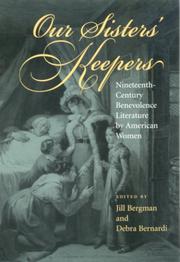
ISBN: 0817351930 9780817381660 081738166X 9780817314675 0817314679 9780817351939 0817314679 Year: 2005 Publisher: Tuscaloosa University of Alabama Press
Abstract | Keywords | Export | Availability | Bookmark
 Loading...
Loading...Choose an application
- Reference Manager
- EndNote
- RefWorks (Direct export to RefWorks)
American culture has long had a conflicted relationship with assistance to the poor. Cotton Mather and John Winthrop were staunch proponents of Christian charity as fundamental to colonial American society, while transcendentalists harbored deep skepticism towards benevolence in favor of Emersonian self-reliance and Thoreau's insistence on an ascetic life. Women in the 19th century, as these essays show, approached issues of benevolence far differently than their male counterparts, consistently promoting assistance to the impoverished, in both their acts and their writings. <
American literature --- 19th century --- History and criticism --- Literature and society --- United States --- History --- Women and literature --- Women authors --- Benevolence in literature --- Charity in literature --- Poor --- Poor in literature. --- Poverty in literature. --- Charity in literature. --- Benevolence in literature. --- English literature --- Agrarians (Group of writers) --- History and criticism.
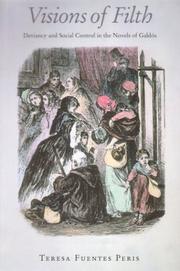
ISBN: 1781386943 1846314380 9781781386941 9781846314384 9780853237280 085323728X 9780853237181 0853237182 Year: 2003 Publisher: Liverpool Liverpool University Press
Abstract | Keywords | Export | Availability | Bookmark
 Loading...
Loading...Choose an application
- Reference Manager
- EndNote
- RefWorks (Direct export to RefWorks)
This book explores how notions of deviancy and social control are dramatized in the novels of the late nineteenth-century Spanish realist author Benito Pérez Galdós. Galdós's treatment of prostitutes, alcoholics, beggars and vagrants is studied within the context of the socio-cultural and medical debates circulating during the period. Drawing on Foucault's very specific conceptualisation of the idea of control through discourses, the book analyses how Galdós's novels interacted with contemporary debates on poverty and deviancy - notably, discourses on hygiene, domesticity and philanthropy. It is proposed that Galdós's view of marginal social groups was much more open-minded, shrewd and liberal than the often inflexible pronouncements made by contemporary professional voices.
Alcoholism in literature. --- Deviant behavior in literature. --- Poverty in literature. --- Prostitutes in literature. --- Social control in literature. --- Prostitution in literature --- Pérez Galdós, Benito, --- Galdós, Benito Pérez, --- Péres Galdós, Benito, --- Pérez Galdós, B. --- Criticism and interpretation. --- Prostitution in literature. --- Perez Galdos, Benito,
Book
ISBN: 9780813551753 9780813548012 0813548012 9786613369932 0813549841 1283369931 9780813549842 9781283369930 6613369934 Year: 2010 Publisher: New Brunswick, NJ Rutgers University Press
Abstract | Keywords | Export | Availability | Bookmark
 Loading...
Loading...Choose an application
- Reference Manager
- EndNote
- RefWorks (Direct export to RefWorks)
In the United States, perhaps no minority group is considered as "model" or successful as the Asian American community, which is often described as residing in positive-sounding ""ethnic enclaves."" Yoonmee Chang's Writing the Ghetto helps clarify the hidden or unspoken class inequalities faced by Asian Americans, while insightfully analyzing the effect such notions have had on their literary voices.
American literature --- Asian Americans in literature. --- Asian Americans --- Poverty in literature. --- Ethnic groups in literature. --- Social classes in literature. --- Model minority stereotype. --- Littérature américaine --- Américains d'origine asiatique dans la littérature --- Américains d'origine asiatique --- Pauvreté dans la littérature --- Groupes ethniques dans la littérature --- Classes sociales dans la littérature --- Stéréotype de la minorité modèle --- Asian American authors --- History and criticism. --- Intellectual life. --- Ecrivains américains d'origine asiatique --- Histoire et critique --- Vie intellectuelle --- Américains aziatiques dans la littérature --- Asian Americans in literature --- Aziatische Amerikanen in de literatuur --- History and criticism --- Intellectual life --- Stereotypes (Social psychology) --- Asians --- Ethnology
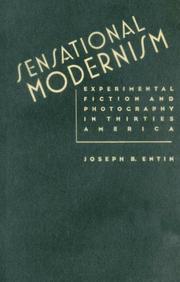
ISBN: 1469606615 9781469606613 9780807831366 0807831360 9780807858349 080785834X 9798890880581 Year: 2012 Publisher: Chapel Hill : The University of North Carolina Press,
Abstract | Keywords | Export | Availability | Bookmark
 Loading...
Loading...Choose an application
- Reference Manager
- EndNote
- RefWorks (Direct export to RefWorks)
Sensational Modernism: Experimental Fiction and Photography in Thirties America
American fiction -- 20th century -- History and criticism. --- Art and literature -- United States -- History -- 20th century. --- Documentary photography -- United States -- History -- 20th century. --- Experimental fiction, American -- History and criticism. --- Mass media and art -- United States. --- Modernism (Literature) -- United States. --- American fiction --- Poor in literature --- Experimental fiction, American --- Art and literature --- Documentary photography --- Mass media and art --- Modernism (Literature) --- Visual perception in literature --- Social problems in literature --- Poverty in literature --- English --- Languages & Literatures --- American Literature --- Crepuscolarismo --- Literary movements --- Art and mass media --- Art --- Photography, Documentary --- Photography --- American experimental fiction --- American literature --- History and criticism --- History
| Listing 1 - 8 of 8 |
Sort by
|

 Search
Search Feedback
Feedback About UniCat
About UniCat  Help
Help News
News